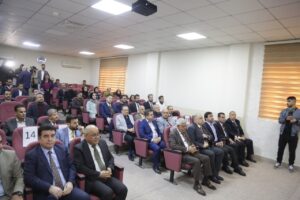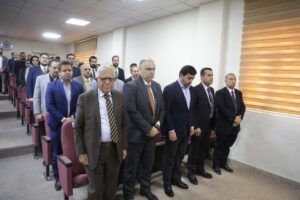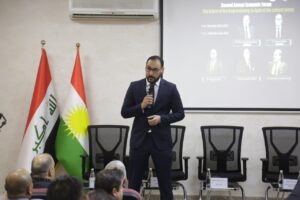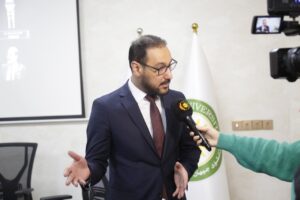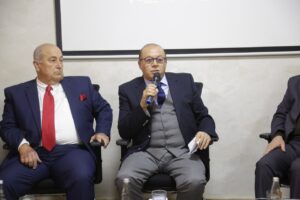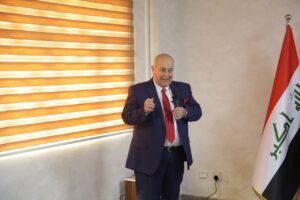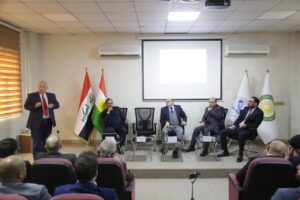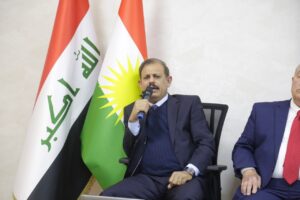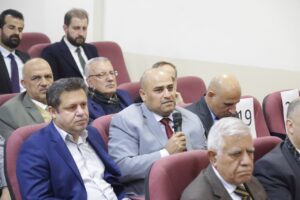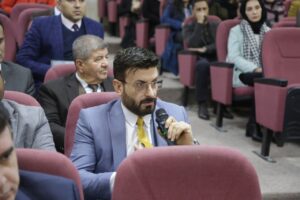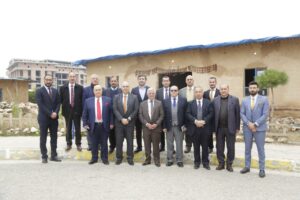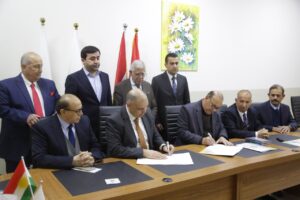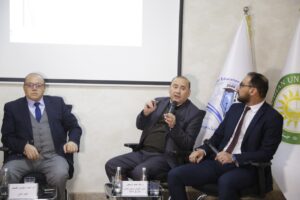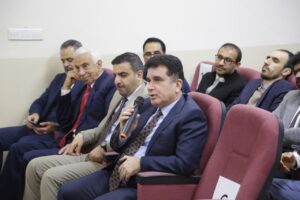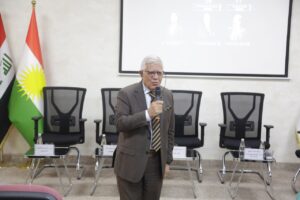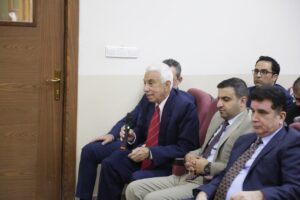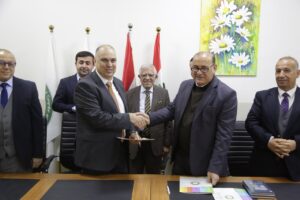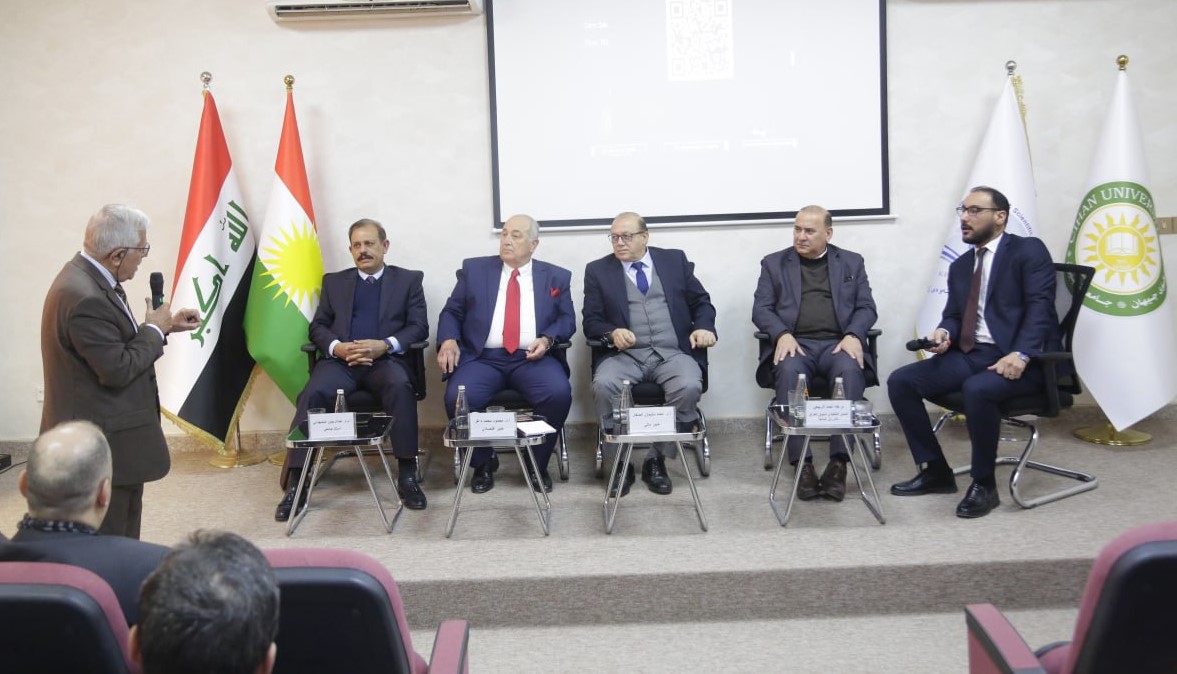On 28.01.2023, Research and Consultation Center at Cihan University – Dohuk held the second annual economic forum in our university, entitled “The future of the Iraqi economy in light of the current crises.”
Which included Four axes:
First axis: The Iraq Stock Exchange – trading indicators for the year 2022. and development requirements. (Speaker: Expert Taha Ahmed Abdel Salam Al-Rubaie – Executive Director of the Iraq Stock Exchange).
Second axis: financial policy in Iraq in determining the priorities of the general budget (speaker: Dr. Ahmed Al-Saffar from the University of Dohuk, deputy and rapporteur of the finance committee in the former Iraqi parliament).
Third axis: Monetary policy in Iraq and the challenges of exchange rate fluctuations, causes, and solutions (speaker: Prof. Dr. Mahmoud Dagher, economist and former vice president of the Central Bank of Iraq).
Fourth axis: assessing Iraq’s economic relations in the international environment (speaker: Prof. Dr. Abd al-Rahman al-Mashhadani, professor of economic relations at the Iraqi University).
Moderator of the session:
Dr. Nawar Al-Saadi, Director of the Research Center at our university.
The session was attended by Dr. Nawzad Yahya Bajkar, Chairman of the Board of Trustees of Cihan Universities, and Mr. President of Cihan University – Dohuk, Dr. Zeravan Abdul Mohsen Asaad, in addition to more than 100 people, including businessmen, academics, media professionals, and bank managers.
In the first axis of the session, Mr. Taha Al-Rubaie spoke about the Iraqi stock market and the indicators for the year 2022, which included the following:
The most important trading indicators:
- Trading on the shares of (92) Iraqi joint stock companies out of (103) companies registered in the market
- Joint stock companies based on the Securities Commission’s decisions.
- Number of suspended companies (3)
- The number of traded shares reached (564,572,921,564) shares.
- The value of traded shares amounted to (894,741,518,521) dinars.
- The number of executed contracts and deals reached (597,135).
- The ISX60 traded share price index closed at (950,585) points in the last session of 2022.
Mr. Al-Rubaie then touched on the most important factors influencing the prices of traded shares and said that the share prices of listed and traded joint-stock companies in the Iraq Stock Exchange are
affected by many factors referred to by a number of research, studies and reports – the most important of which were:
The financial position of the joint-stock company, and the levels of profit realization compared to the size of the capital – or the deficit in activity. And annual cash profits and its stability from year to year. Indicators of national economic growth, annual gross domestic product, annual per capital income, and annual inflation indicators. The mechanisms of stimulating and making the market, as well as the governance of joint-stock companies, in addition to international accounting standards, and finally foreign investment.
Then he concluded his speech with the most important plans for the year 2023 for the Iraqi market, which are:
- Organizing sessions and trading activity in securities.
- Listing new joint stock companies and diversifying the traded securities.
- Culture of trading in securities.
- Oversight, inspection, and compliance with anti-money laundering and terrorist financing controls.
- Infrastructure development – adding new systems to activity and providing new financial services -financial inclusion.
- Application of new instructions and rules – compliance with international standards of activity.
- Participate in amending prevailing laws in accordance with international standards.
Then the conversation moved on to economic policies in Iraq and started from financial policy with the second speaker, Dr. Ahmed Al-Saffar, who spoke about fiscal policy, specifically about the spending policy of Iraqi governments after 2003, as well as public revenues, the budget, and coordination between fiscal policy, monetary policy, and other policies.
Where the successive crises in Iraq led to serious results that cast a shadow over the Iraqi society, and perhaps the most dangerous of these effects is the arrival of inflation in all aspects of social, economic and political life,Iraqi society suffers from a clear and large gap in the development of human capital and structural problems that are resulted of the delay in the comprehensive development process and its stumbling in wars, economic blockade, occupation, internal divisions, the effects of forced displacement, and the draining of minds and experiences. Therefore, poverty, illiteracy, and unemployment on the one hand, and the qualitative gap between females and males in the field of educational and health indicators and in the field of participation on the other hand, lead to perpetuating a state of confusion and underdevelopment, in addition to the impact of government spending. Increasing security and defense at the expense of public services and economic services. And with the adoption of the Iraqi state’s policy of transition towards a market economy, which caused great damage, it resulted in an increase in the disparity in opportunities between the upper strata on the one hand and the lower strata and toiling classes of the poor due to their inability to purchase these services, and thus reducing their chances of improving their standard of living. The economic and social marginalization of these groups is on the rise.
As for the Third axis, which Dr. Mahmoud Dagher dealt with in his talk about monetary policy in Iraq, he mentioned:
The expected effects if the current crisis continues with the rise of the dollar, the following will happen:
- High prices of imported goods.
- An accelerated rise in inflation.
- Disruption of the sterilization mechanism in the Central Bank of Iraq.
- Increased issuance of the local currency to pay the government’s obligations to the public and private sectors.
- Scarcity in the supply of goods and services due to the suspension of remittances.
- A comprehensive economic crisis.
Then it also touches on the other aspect of the crisis, which is:
- A real opportunity to direct traders to the official channels to carry out their imports.
- Activating the role of customs and protecting the local product.
- Activating the role of taxes by providing incentives, support and exemptions for the next 3 years to everyone who declares his business and resorts to official financial channels in conducting his dealings.
- Purifying the banking system from impurities and parasitic work.
- Eliminate unofficial intermediaries and reduce the number of mediation and exchange companies.
As for the Fourth and final axis, it was with Dr. Abd al-Rahman Najm al-Mashhadani, Professor of International Economic Relations, who talked about Iraq’s international relations, the most important of which are:
Economic and trade relations with Arab countries:
He saidthat Iraq has economic and commercial relations with Arab countries, as well as commoninterests since the seventies of the last century, which were represented in concluding bilateral and multilateral agreements and memorandums of understanding in addition to joint projects and partnerships. These relations have gone through several stages, according to the circumstances that Iraq in particular and the regioningeneral went throughand the orientations of its leaders. During the seventies and eighties, these relations flourished remarkably, reaching their climax through joint action and facilitation of trade between Arab countries under the umbrella of the Arab League and its economic and social council. This period also witnessed the emergence of economic blocs in which Iraq had a major role, such as the Arab Cooperation Council, as well as the bilateral relations of the Arab countries, which reached their highest levels during that era. Then followedthe 1990s, the Gulf War, and the severe economic blockade that Iraq was subjected to, which made it isolated from its Arab surroundings, which greatly weakened the commercial activity it enjoyed with its Arab brothers.
And after Iraq signed the memorandumof understanding for food and medicine with the United Nations, whichallowedIraq to purchase its basic needs of foodand medicine, it was a new beginning for the return of commercial relations for Iraq with some Arab countries after Arab principles were approved for supply, so that Iraq turned into an importing country only.
The political, economic and security developments that Iraq witnessed after its occupation in 2003 led to the development of its economic relations with different countries of the world in general and Arab countries in particular, which greatly affected the Iraqi economy in general and trade in particular. In a short and remarkable period, by activating the previously concluded trade agreements with these countries, holding joint committees and signing new agreements, as well as finding new patterns of cooperation.
Which was marked by the establishment of coordinating councils and joint committees to form a new pattern of cooperation between Arab countries aimed at activating relations at the strategic level and opening new horizons of cooperation in the political, security, economic, trade and investment fields.
He also touched on economic and trade relations with neighboring countries Turkey and Iran
Iraq’s economic and commercial relations with neighboring countries were characterized by the depth of those relations, in addition to the geographical and strategic location in the region, the common borders with them, and the border crossings that regulate the flow of people, goods, and commodities. Relations with neighboring countries are strengthened based on the principle of common interests and mutual respect. For example, Iraq signed with Turkey in 2008 the strategic political declaration between the two countries, which is considered another type of cooperation between them, which resulted in the convening of a higher council for strategic cooperation.
He held several meetings, the last of which was in 2014, whichresultedinthe signing of 48 memorandums of understanding for cooperation in various fields, five of which were in trade cooperation. In 2009, a Comprehensive Partnership Agreement was signed in Baghdad to be another tool in the field of strengthening economic and trade relations with Turkey. A paragraph would later be added to it, which included cooperation in the field of water to secure Iraq’s shares of water supplies.
As for Iran, Iraq did with it the trade agreement signed in Tehran in 1977, from which a joint committee emerged. It held 4 sessions, the last of which was in Tehran in 2021, in addition to signing several memorandums of understanding in various fields. As a result, the trade exchange rate between the two countries continued at more than $9,000 million annually for the period 2008-2021.
Then the dialogue moved to asking questions to the speakers, and then the sessions were concluded by presenting some recommendations and proposals to the concerned authorities.
